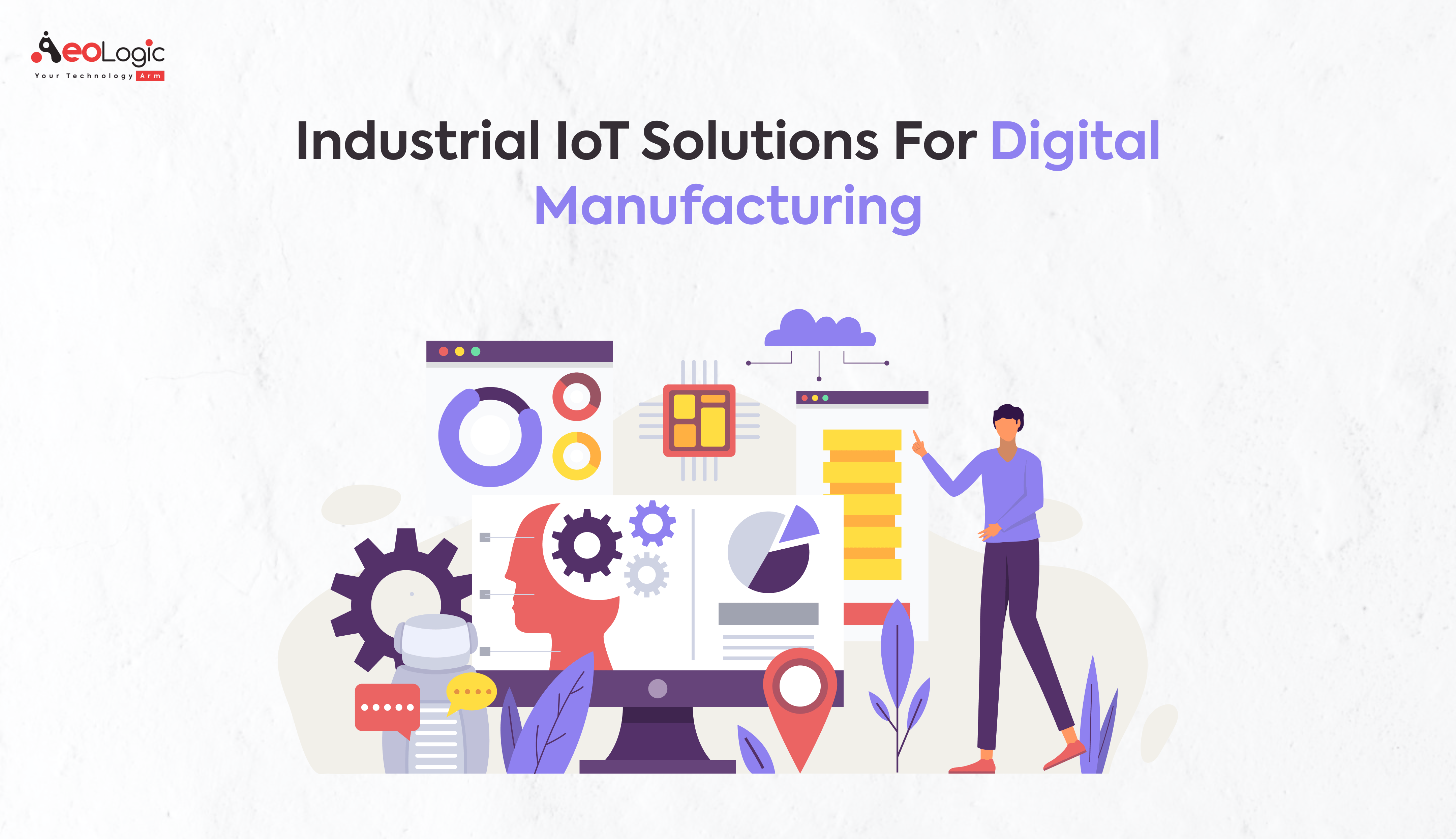Introduction
In the quickly evolving field of manufacturing, the Internet of things (IoT) is no longer a luxury, but a necessity. Industry 4.0 brings technological advancements making businesses more adaptable, innovative, and flexible. This blog post will dive into the crucial industrial IoT solutions for digital manufacturing and anticipate the forthcoming trends set to revise the sector. So, let’s explore together the incitive world of IoT in manufacturing.
Also read: Role of Digital Transformation in Manufacturing
IoT Solutions For Digital Manufacturing Industry
The Industrial Internet of effects (IIoT) is a step towards making traditional manufacturing into smart spaces. IoT in manufacturing is driving unknown disruption and can help make industry safer for frontline workers, adding productivity and effectiveness. And yes, it can save you millions of your capital.
Here’s a look at some instigative supporting statistics.
- Experts are forecasting the global IoT in manufacturing market size to increase from USD 33.2 billion in 2020 to USD 53.8 billion by 2025 at a Compound Annual Growth Rate (CAGR) of 10.1 percentage.
- According to a report issued by PwC, 90% of manufacturers believe that digitizing the product process will bring further long- term benefits than pitfalls. Furthermore, as per a study, in the United States, roughly 35% of manufacturers are gathering and using data generated from smart detectors for improving manufacturing processes.
- Experts predicts that separate Transportation, Manufacturing& Logistics, and Utilities diligence will be spend around 40 billion dollars each on IoT platforms, devices, and services.
- 58% of manufacturers say IoT is needed to transfigure artificial operations digitally. The check also stressed that investment costs are the most significant hedge to precluding briskly relinquishment of IIoT in manufacturing.
- According to Accenture, 46% of respondants among American organizations observe IoT as an opportunity to boost employee productivity. Bottom line: The shift toward Industry 4.0 is apparent in the manufacturing sector. Manufacturers are eager to embrace smart manufacturing, moving toward a new position of connected and intelligent manufacturing systems.
How IoT is Transforming Manufacturing Industry
Digitization has been augmenting the manufacturing geography. Companies are looking to transfigure their ecosystems through innovative technology. The research studies also show that digital leaders present game- changing Industry 4.0 results. Today, digital success transformations are inspiring. And here is a quick look at how IoT is changing the manufacturing industry.
Get in touch with us to know more about IoT Solutions!
Predicts Early Malfunctions
According to an early establishment, 82% of companies have endured unplanned time-out; and unplanned time-out in manufacturing can bring a company as much as $ 260,000 an hour. Machine downtimes and damages can be critical to manufacturing companies. Plus, they can also jeopardize frontline workers. IoT tools have several detectors that can cover the temperature, vibration, voltage, currents, and more. So, these detectors can help with early warning signs of any forecasted malfunctions, creating a safer plant.
Higher Margins and Customer Satisfaction Levels
Manufacturers have instigative openings with the use of IoT solutions for digital manufacturing and connected products. The benefits performing from affiliated products start with enhancing the being service delivery. Remote diagnostics increase client satisfaction and reduce time- to- form, which helps produce stronger bonds with customers. Therefore, early warning and discovery signals can drive quality advancements in future products. And the new services can insure advanced markings and bettered client satisfaction situations.
Improved Asset Management via Connected Supply Chain
Manufacturers have been facing advanced client service prospects. One of the critical prospects is quick delivery time. Against this background, manufacturers have been exploring micro-logistics networks to meet accelerated delivery requirements. The use of IoT in the connected supply chain at the asset position is helping to manage inventory positions. Plus, get lesser visibility into factual force throughout the complex logistics network.
Implements Operational Intelligence
Autonomous machinery can take over time- consuming and heavy human labor work, and experts anticipate this as the future of manufacturing. When machines are connected, it helps to produce intelligent networks that communicate and coordinate with each other with little human intervention.
Boosts Quality
IoT detectors recognize data on product specifications and other criteria, including data from the third party at different stages of the product cycle. Likewise, manufacturers can determine which products meet quality specifications and need a physical examination. Moreover, the data pertains to the composition of the raw resources employed and the effect of transportation and other factors on the finished goods. Plus, if integrated into the result, the IoT system will give data on consumer responses to the product. The perceptivity can help find and fix quality problems.
Exciting IoT Use Cases in Manufacturing
Remote Monitoring
Remote monitoring is a great use case to look out for leaders with artificial means who can find immense application with IoT- connected means. Then, IoT detectors can cover outfit operation and health, which helps assess performance. Plus, the detectors can also help emplace the service if there are any problems.
Digital Twins
Digital twinning is gaining popularity. IDC cited that companies who invested in digital binary tech in 2018 could anticipate a 30 percent enhancement in cycle times of critical processes. Therefore, leaders who can work the power of IoT blended with the Digital Twin can enjoy an in- depth analysis. Digital Twin technologies are the pall, IoT, Extended Reality( XR), and AI.
So, by applying the IoT solutions for digital manufacturing approach (aka Digital Twins), businesses can produce robust digital clones, virtual clones of physical objects, and their operation on the manufacturing bottom can be handy. With virtual clones of outfit and spare corridor directors can pretend processes, discover issues, and achieve demanded results without risking or damaging physical means.
Logistics Management
Logistics in manufacturing companies are risky due to the lack of control over the rainfall. Plus, the high liability of fraud and the large number of means that need to be managed. Companies that are relying on transportation can take into account IoT- led connection between different tools and systems.
IoT operations for logistics can deal with numerous use cases along a typical supply chain, from warehousing to fleet operation and cargo tracking. Therefore, technology acts as a vital force behind digital transformation.
Manufacturing KPIs
Key Performance Indicators (aka KPIs) in manufacturing are quantifiable criteria that give critical perceptivity into business performance. Furthermore, the criteria are important for manufacturers because they’re defined and measured to help businesses concentrate on what’s most important. Plus, they can track, dissect, and optimize performance over some time. In fact, there are numerous similar KPIs, and one generally- used manufacturing KPI is overall equipment effectiveness (OEE) which is measured by calculating the plant’s performance, availability, and standard. While an acceptable measure of performance, especially at the factory line, OEE should immaculately be used with other KPIs to more understand performance from different perspectives
Also read: Benefits of IoT Solutions in the Manufacturing Industry
Wrapping Up
All in all, IoT solutions for digital manufacturing presents economic growth openings. And some leading players are formerly exploring niche technologies to influence digitization to optimize the benefits. Eventually, the promising technology can pave the way for the manufacturing industry and achieve the coming generation of manufacturing excellence.
To know more about digital manufacturing get in touch with us.
Connect with us for IoT Solutions for Digital Manufacturing










